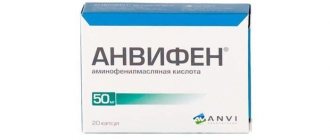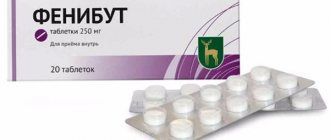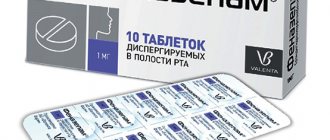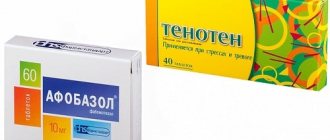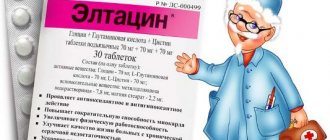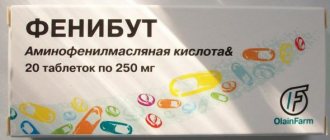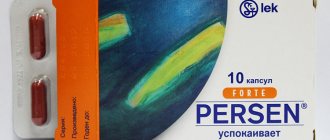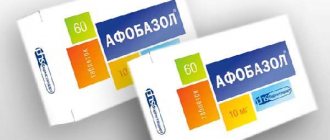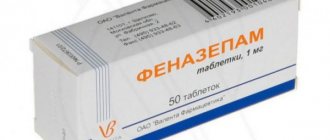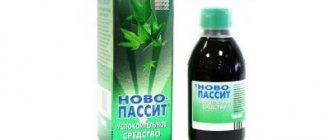Phenibut or Afobazole – which is better? Comparison of drugs
The number of people suffering from nervous disorders is constantly growing in the modern world.
Against this background, the growth trend of anti-anxiety drugs is also increasing. Today, the pharmaceutical industry offers a wide range of drugs with a similar effect. Among modern medications, two drugs stand out: phenibut or afobazole.
We will tell you which one to choose for treatment using the example of comparative characteristics.
Description of drugs
Let's proceed to a detailed description of the characteristics of each of the compared drugs. Let's find out whether it is possible to take afobazole and phenibut together, which is what patients ask about.
Phenibut
Phenibut is a representative of the class of nootropics. The use of the medication helps:
- improved sleep;
- eliminating feelings of fear;
- blocking unpleasant symptoms due to mental disorders;
- normalization of blood flow to brain cells.
The action of the medicine occurs quickly, which allows for a noticeable improvement in the patient’s condition almost instantly.
Indications
Experts recommend the remedy in the following situations:
- obsessive states;
- alcohol withdrawal syndrome;
- apathy;
- increased anxiety;
- lethargy;
- Meniere's disease;
- mild depression;
- insomnia;
- neuroses;
- vegetative-vascular dystonia, accompanied by a psychosomatic clinic;
- recovery from traumatic brain injury;
- problems with the activity of cerebral vessels;
- migraine;
- dizziness;
- childhood movement disorders, stuttering, tics, enuresis;
- consequences of shock, severe fright.
Contraindications
Contraindications and restrictions to the use of the medicine are as follows:
- children under 3 years of age;
- pregnancy and breastfeeding;
- renal failure;
- allergic reaction to the components of the drug;
- ulcerative lesions of the gastrointestinal tract.
Side effects
Phenibut is well tolerated, but sometimes the drug has the opposite effect. The patient may experience the following symptoms:
- irritability;
- state of drowsiness;
- feeling of fear;
- dizziness;
- skin rash;
- headache;
- nausea;
- liver and blood problems.
Such adverse reactions occur due to improper use of the prescribed dosage of the medication, as well as during a long course of treatment.
Interaction with other drugs
When Phenibut is combined with antiparkinsonian, hypnotic, antipsychotic and antiepileptic drugs and narcotic analgesics, the effect of the latter drugs increases. Therefore, a similar combination is possible, but after consultation with a doctor.
Afobazole
Afobazole is a representative of the group of axiolytics (tranquilizers). The medication is characterized by a gentle and safe effect on the body. The medicine does not cause addiction or withdrawal symptoms in patients; it has a small list of side effects. Its action is aimed at reducing feelings of fear and anxiety.
: Who should use Snoop nasal spray?
Side effects and drug interactions
Afobazole, unlike phenibut, is characterized by rare manifestations of adverse reactions of the body and a small list of contraindications. Frequent prohibitions on taking the medicine and unpleasant manifestations due to its use include:
- individual sensitivity in the form of headache or rash;
- acute lactase deficiency;
- age under 18 years;
- period of pregnancy and lactation.
Simultaneous use
Patients often ask whether it is allowed to use phenibut and afobazole at the same time? These drugs, when combined, can enhance each other's effect. But such a treatment regimen should only be determined by the attending physician.
Drug comparisons
To compare the drugs described, you should understand in detail how they differ and what their mechanism of action is.
Differences
- Active component. In afobazole it is fabomotizole, in phenibut it is aminophenylbutyric acid.
- Age of application. If phenibut is approved for the treatment of children, then afobazole is allowed to be used in adults.
- Mechanism of action. Phenibut, in addition to eliminating stress, improves cerebral circulation. Afobazole gives an anxiolytic effect, affects the brain subcortex, which is responsible for emotions, due to which a person calms down.
- Speed of action. Phenibut provides rapid effectiveness. Afobazole gradually accumulates, giving maximum effect after a month.
- Safety. Although Phenibut is approved for children, it irritates the gastric mucosa. With prolonged use it is addictive.
- Release of the drug. Afobazole is sold freely in pharmacies, and phenibut is available with a prescription.
: Symptoms of laryngitis in children and how to treat it
The differences should also include the novelty of the drugs.
Phenibut is an old generation medicine, it has an impressive list of side effects, and Afobazole is a modern medicine.
What's better
When considering the question of phenibut or afobazole, which is better, it is important to understand that the second medication is a representative of tranquilizers (axiolytics), which have no effect on improving cerebral circulation. When a person has a similar problem, it is better to use phenibut.
In medical practice there is no such thing as a “worst” or “best” drug. Doctors prefer the term “optimal.” This is explained by the fact that each patient in a certain life situation is suitable only for one, sometimes a couple of medications. They are optimal for the treatment of certain pathologies.
The optimal medications for each patient are different. It is impossible to calculate the “best” remedies that would become a universal key to solving the problem for all people with any variants and forms of anxiety. This issue is resolved by a specialist individually.
When a person is in a prolonged depressive state, without harmful cerebral circulatory disorders, afobazole is most effective. The product is modern, safe, and effective in this situation.
For cerebrovascular disorders, Phenibut will be used.
For this reason, it is impossible to recommend the best medication; everything will depend on the established diagnosis and the physiological characteristics of the patient’s body.
April 9, 2020 – life-sup
Share with friends on social networks
Source: //life-sup.ru/fenibut-ili-afobazol-chto-luchshe-sravnenie-preparatov/
Simultaneous use
When treating depressive conditions and various disorders of the central nervous system, it is important to know whether Phenibut and Afobazole can be taken at the same time. Each of the drugs has a positive effect on the functioning of the nervous system, eliminates anxiety and relieves feelings of fear.
In case of primary identified disorders of the central nervous system, neurologists recommend starting treatment with Phenibut, then Afobazole can be taken. The simultaneous use of medications is not excluded, but in minimal effective doses, the compatibility of Phenibut with Afobazole is good. As an addition to this treatment regimen, specialists can prescribe glycine, as well as vitamin complexes to normalize the functioning of the peripheral nervous system and central nervous system. You can take these drugs together after consulting your doctor and only according to the recommended regimen.
What is better “Phenibut” or “Afobazol”: comparison and which is better
The number of people suffering from various types of nervous disorders is growing steadily every year.
Chronic overwork, long-term psychologically traumatic situations, family troubles are only part of the negative factors leading to disruption of the central nervous system.
It is necessary to begin the fight against psychosomatic manifestations as early as possible. Otherwise, serious organic pathologies may arise due to nervous disorders.
Modern pharmacology today presents a large selection of medications that can correct the functioning of the nervous system.
These include drugs often prescribed by doctors - Phenibut and Afobazol.
"Phenibut": characteristics of the drug
"Phenibut" is a drug from a number of nootropics . It also has anxiolytic and mild psychostimulating effects.
It has been used in medical practice since 1975 for the treatment of mental disorders and nervous diseases.
The main active ingredient is aminophenylbutyric acid hydrochloride .
Minor ingredients include: milk sugar, potato starch, calcium stearate.
In pharmacies there is a tablet form of the drug containing 250 mg of active substance per tablet. The drug can sometimes be found in powder form, with a dosage of 100 mg.
Produced by various pharmaceutical enterprises in the countries of the former USSR. Production is carried out in the Republic of Belarus, Latvia, Russia.
Indications and contraindications
Phenibut is prescribed if a person has the following conditions:
- Psychopathy.
- Asthenic syndrome.
- Groundless fear and anxiety.
- Otogenic labyrinthitis.
- Psychoneuroses.
- Insomnia, nightmares in older people.
- Meniere's disease.
- Dizziness associated with dysfunction of the vestibular apparatus.
- Children's enuresis.
- Stuttering in a child.
- Tics of different origins in children.
- Withdrawal syndrome.
- Urinary retention due to myelodysplasia.
- Speech disorders (in adults).
- Disruption of cerebral vessels.
- VSD.
- Migraine.
- Open-angle glaucoma (as part of complex therapy).
It is often used as a premedication before surgical interventions and invasive diagnostic procedures.
Contraindications to the use of this medicine are: age under 8 years. allergy to components. breastfeeding period. pregnancy.
It should be prescribed with caution to patients with gastrointestinal diseases (erosions, ulcers) and liver failure.
Like most nootropics, Phenibut is well tolerated by patients . Side effects are rare. Sometimes nausea, irritability, headache, drowsiness, allergic reactions and skin rash may occur.
As a rule, such reactions are caused by exceeding the recommended dose or long-term use of the drug.
pharmachologic effect
The pharmacological effect of a drug (medicine) is to affect the blood flow of the brain , increasing its volumetric velocity. In addition, the active substance of the drug helps to stabilize metabolic processes in brain tissue.
Due to the presence of antiplatelet properties of drugs, the tone of cerebral vessels decreases, microcirculation improves, and the ability of platelet adhesion decreases. This leads to improved blood circulation in the brain.
The tranquilizing effect , which the pharmaceutical drug also has, helps reduce the severity of asthenia and vasovegetative symptoms. Moreover, the patients’ well-being noticeably improves already in the first days of treatment.
A course of medication can help normalize sleep, reduce anxiety, reduce headaches and heaviness in the head.
Psychological indicators also improve . Memory becomes stronger, performance increases (mental and physical), and the emotional background is normalized.
Brain activity is activated, as a result of which patients find optimal solutions to various problems more easily and quickly. Motivation and interest in various activities increases. The speed and accuracy of psychomotor reactions improves.
To achieve a lasting therapeutic effect, Phenibut is prescribed in courses lasting from 2-3 weeks to 2 months . The duration of treatment and the dose of the drug are determined by the doctor, depending on the onset of stabilization of the condition.
If necessary, courses can be repeated, but the intervals between them should be at least 3-4 weeks .
"Afobazol": characteristics of the drug
Afobazole is an anxiolytic (tranquilizer) that is not included in the group of benzodiazepines. It has been present on the domestic pharmacological market since 2000. So it is considered a very “young” drug.
This medicine is intended to treat various anxiety conditions.
It has a calming ( anti-anxiety ) and mild stimulating effect.
"Afobazole" was synthesized in Russia, by the Institute of Pharmacology of the Russian Academy of Medical Sciences. It is a selective tranquilizer, which, through the efforts of scientists, was devoid of the negative side factors inherent in benzodiazepines, the main group of anti-anxiety medications.
The main component of the drug is fabomotizole . Auxiliary ingredients include: collidon, MCC, polyvidone, lactose, etc.
The medication has only one release form - tablets containing 5 mg and 10 mg of fabomotizole.
How are the drugs similar?
Both pharmaceuticals were synthesized in our country. Produced in identical release forms. They have a similar therapeutic effect - they relieve anxiety and fears .
Similar features include their ability to resist damage to nerve cells and increase their resistance to various damaging factors.
Both have a calming effect. Because of this, they can be prescribed for similar pathologies.
The medications in question have a number of identical contraindications for use.
What is the difference
Pharmaceutical products differ according to the following indicators:
- The main difference is different active components .
- Belong to various pharmaceutical groups. “Afobazol” is a tranquilizer (anxiolytic), “Phenibut” is a nootropic.
- The mechanism of action is also different. The anxiolytic effect of Afobazole is carried out on the subcortical structures of the brain responsible for the emotional state. Due to this, the person calms down. The nootropic, in addition to relieving stress, improves blood circulation in the brain.
- The effect of taking Phenibut develops faster . The second pharmaceutical demonstrates its healing properties only after a week.
- Afobazole has fewer side effects.
- Long-term and illiterate use of Phenibut can be addictive. His “counterpart” is devoid of such negative qualities.
- A nootropic drug may irritate the mucous membrane of the gastrointestinal tract. In this regard, the anxiolytic is safer.
- Phenibut is a strictly prescription drug. The second remedy is sold freely in pharmacies.
- There are differences in age indications for use. Phenibut, although considered an outdated drug, is approved for use in childhood. The second medication is prescribed only to adult patients.
Prices for tablets also vary significantly. "Phenibut" - from 64 to 380 rubles . (depending on the number of tablets in the package and the country - from 380 to 550 rubles .
What is better to choose
Having examined the presented medications, it is difficult to say which one is better or more effective. Moreover, they are not analogues.
If a person experiences increased vulnerability, anxious suspiciousness, excessively emotional reactions, and uncertainty, it is better to choose Afobazol. But provided that such conditions are moderate and there is no cerebral circulatory impairment.
If anxiety states are pronounced and are accompanied by a disorder of cerebral blood flow, Phenibut will be the drug of choice. It must be chosen for the treatment of the child.
But, I would like to remind you that a doctor must prescribe drugs.
There are often cases when it is advisable to use both medications. In such cases, the dosage and duration of therapy are established by a specialist for each patient individually.
Source: //vchemraznica.ru/chto-luchshe-fenibut-ili-afobazol-sravnenie-i-chto-luchshe/
Indications
Phenibut refers to drugs derived from γ-aminobutyric acid. This substance is the main inhibitory transmitter of the central nervous system of all mammals, including humans. The active substance Phenibut acts as a biogenic stimulator of neurotransmitter and metabolic brain reactions.
In a state of inhibition, the brain requires less oxygen and energy supply, and this saves and protects the brain from prolonged stress and aging.
Pharmacological action of Phenibut:
- increasing blood supply to the brain, relieving spasms, dilating blood vessels
- equalizing the balance between excitation and inhibition in the brain
- protection of brain nerve cells from oxygen starvation
- activation of energy and metabolic processes in brain neurons
Anxious and depressed states, fears and nervous tension are indications for prescribing Phenibut.
The drug Phenibut is indicated for the following diseases:
- neuropsychic conditions accompanied by anxiety, fear and anxiety
- mental and physical fatigue
- depressive and stressful conditions
- Meniere's disease (disease of the inner ear leading to deafness)
- as a sedative before painful medical procedures and surgery
- insomnia and disturbing dreams
- dizziness and tinnitus due to pathologies of the vestibular apparatus
- prophylactic medicine for kinetosis
- in pediatric practice for nervous tics, stuttering, enuresis
- withdrawal syndrome (withdrawal) in the treatment of alcoholism
There is evidence of the positive dynamics of Phenibut in Parkinson's disease.
The summary for the use of Phenibut indicates the following contraindications:
- children under 2 years old
- individual reaction
- pregnancy
- lactation
- liver pathology
Online magazine about choosing the best goods and services
16.07.2019 16:07:47
Expert: Boris Kaganovich
For various nervous disorders, Phenibut and Afobazole can be prescribed. It’s worth noting right away that they are not analogues, so they have many differences. We looked at their advantages and disadvantages to find out which remedy is best suited for which disorders.
| A drug | Advantages | Flaws |
| Phenibut | + Positive effect on the blood vessels of the brain and the nervous system+ Rapid onset of effect+ Does not cause depression of the central nervous system+ Does not provoke the development of allergies+ Low toxic+ Few contraindications+ Can be prescribed from 8 years | – Not prescribed for diseases of the gastrointestinal tract; – You cannot operate transport or complex machinery during treatment. |
| Afobazole | + Wide range of application+ Does not cause drowsiness+ Does not affect the reaction rate+ Does not lead to withdrawal syndrome+ The result of treatment is visible within 5-7 days from the start of taking the drug+ Dispensed without a doctor’s prescription+ Side effects are unlikely, the list of them is small - allergies and headache + Few contraindications | – Not used in pediatrics, contraindicated for use under 18 years of age – Cannot be prescribed during pregnancy – May cause allergic reactions – Overdose leads to sedation |
The nootropic and psychostimulant drug Phenibut contains the same component in its composition. Manufacturer: Obninsk CFC for Rick-Pharma in the Russian Federation. Available in tablets.
Its dominant actions are antiamnestic and antihypoxic, which allows Phenibut to be used for cognitive impairment, disorders of the vestibular system and for the prevention of the consequences of head injuries.
Additional actions - anxiolytic, antiplatelet, psychostimulant. The drug reduces the manifestations of asthenia, normalizes sleep, eliminates increased irritability and lability. It also helps improve mental and physical performance.
Phenibut is used for memory and attention disorders, to increase initiative and interest. Already from the first days of treatment, it improves the objective well-being of patients with asthenia.
Research and effectiveness
Nootropic drugs have no FDA-approved indications. There is no objective evidence of their effectiveness. Since 1997, only 2 clinical trials of the drug have been conducted. None of the listed indications for use have the specified degree of evidence.
Side symptoms
Side effects during Phenibut therapy may include:
- nausea - often occurs at the beginning of therapy;
- hepatotoxicity – with long-term use in high doses;
- emotional lability, insomnia - observed more often in children.
- If other side symptoms appear, you should talk to your doctor.
Dosage
Phenibut is taken before meals. For asthenia and anxiety, adults drink 250-500 mg 3 times a day. From 8 years - 250 mg 3 times, after 14 years adult doses are used. The maximum dosage is 750 mg, in old age – 500 mg.
An increased dose of 750 mg is used for exacerbation of Meniere's disease, for a one-time elimination of dizziness and vestibular disorders. To prevent motion sickness, use 250 mg 3 times a day.
The duration of treatment varies depending on the disease. The drug can be used for a long course - 4-6 weeks or more.
Phenibut is a low-toxic drug, so an overdose is unlikely. The drug will be hepatotoxic when consumed 7-14 g of the drug per day. Then there may be liver dystrophy and eosinophilia develops. Possible symptoms of overdose are hypotension, nausea, vomiting. There is a risk of kidney failure.
Who is it suitable for?
The medicine Phenibut can be prescribed by a doctor for:
- memory and attention disorders;
- insomnia and other sleep disorders;
- decreased emotional activity;
- tics, urinary incontinence, stuttering;
- Mainer's disease;
- dysfunctions of the vestibular apparatus.
The drug is also used in the complex treatment of alcoholism, when it is necessary to relieve somatovegetative and psychopathological disorders that accompany abstinence.
Description of Afobazole
Afobazole is a tranquilizer based on fabomotizole. Available in tablets. The manufacturing company is Pharmstandard-Leksredstva in the Russian Federation. Can be purchased without a prescription.
The drug gives a psychostimulating effect. The mechanism of action is based on a combination of anti-anxiety and stimulating effects. Reduces anxiety, increased irritability, somatic symptoms of anxiety. Helps with cognitive impairment, stress, and depressed mood. It is especially effective when used for asthenic features.
The effect from the moment the drug is prescribed develops within a week. A lasting result is observed by the end of the month of therapy and lasts for another 14 days. The advantages of the drug are that it does not cause muscle weakness and does not lead to withdrawal symptoms.
To whom is it assigned?
For adults, the drug is prescribed for anxiety conditions and neurasthenia. Can be prescribed for somatic diseases - asthma, IBS, ischemic heart disease, hypertension, arrhythmia, oncological pathologies.
Afobazole can be included in complex treatment for sleep disorders, neurocirculatory dystonia, and abstinence. The product helps to relieve symptoms of PMS and withdrawal symptoms when quitting smoking.
Cost and analogues
| Means | Price | Analogs |
| Phenibut | 250 mg No. 20 – from 80 rubles | Noobut |
| Afobazole | 10 mg No. 60 – from 350 rubles | Substitutes: Adaptol Mebicar |
Which drug is better
Phenibut and Afobazol are produced in Russia, have the same release form, and have some similar therapeutic effects - they help with anxiety disorders. They can be prescribed for the same pathologies, but are not interchangeable.
Phenibut acts more quickly, but has more side effects, can cause withdrawal syndrome, and has a bad effect on the gastrointestinal mucosa. This is a stronger drug that is prescribed for serious disorders. Afobazole is inferior in that it cannot be used before the age of 18.
Afobazole and Phenibut should not be used for self-medication. The use of funds must be justified, so you should first consult your doctor.
Source: //expertology.ru/sravnivaem-fenibut-i-afobazol-opredelyaem-luchshiy/
Side effects
Side effects of the medicine may appear within the first day or even hours of use. Sometimes this happens after a long course of treatment. Phenibut is usually well tolerated and side effects are not that common, but they do happen. As a rule, reactions to taking Phenibut occur at the beginning of treatment. The following side effects are noted when taking the drug:
- allergic manifestations in the form of red spots, rashes, itchy skin
- drowsiness
- nausea
- headache
- excitation
- dizziness
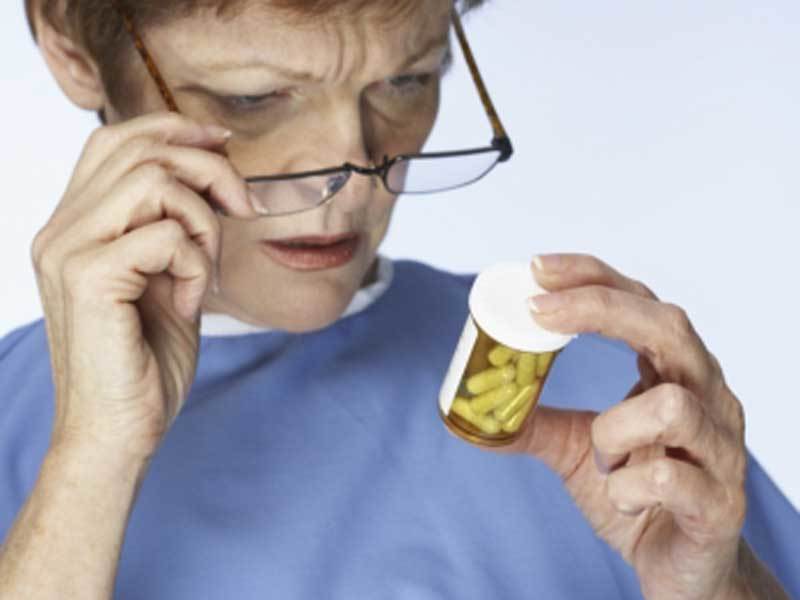
If there are any signs of side effects of the medicine, you should inform your doctor. In such cases, the doctor reduces the dosage of the medicine or replaces treatment with other drugs.
Phenibut or Afobazole - which is better?
Neurotic conditions can appear at any age, but they are especially characteristic of older people. A complex of concomitant diseases, hormonal changes and sleep disorders are often among the factors leading to anxiogenic disorders.
The prevalence of pathological anxiety states and phobias reaches 12%, and neurotic symptoms can be experienced by up to 45% of representatives of this age category. Selective anxiolytics are a new generation of drugs that can cope with anxiety without side effects of sedation and cognitive effects.
These include drugs such as Afobazole or Phenibut. The review below briefly discusses their main properties.
There are contraindications, consult a specialist
Phenibut and Afobazole - what are the differences?
Afobazole and Phenibut belong to a group of drugs that relieve anxiety and have a nootropic effect. They have the same release form - tablets, but the composition of the active substances is different. Both have been developed and introduced into clinical practice in our country. Not applicable in other countries.
Price difference
The price difference between Afobazole and Phenibut is significant. For 20 days of use, you will need 1 package (60 tablets) of Afobazole, costing from 316 to 380 rubles. The price of a package of Russian-made Phenibut (20 tablets) is about 220 rubles, that is, 60 tablets will cost 660 rubles. And if you want to take Latvian-made Phenibut, then the amount needs to be doubled.
In an attempt to decide for yourself the question of Phenibut or Afobazol - which is better to buy, do not forget to consult with a specialist. After all, despite the fact that you do not need a prescription to purchase these drugs, you can harm yourself if you use them uncontrollably.
Source: //www.kliwi.ru/2016/03/fenibut-ili-afobazol-chto-luchshe.html
What is the difference between Phenibut and Afobazole?
Afobazole is a mild tranquilizer that also has an activating and neuroprotective effect.
The drug contains the substance Fabomotizol, which restores nerve cell receptors, helping the nervous system to work even under prolonged conditions.
nervous tension.
Afobazole eliminates anxiety disorders of various origins, irritability, fear, panic attacks, helps cope with
prolonged stress.
The drug is well tolerated and does not cause drowsiness, dependence or addiction, and has a long-lasting effect that manifests itself even after discontinuation of the drug.
It should be noted that the drug does not interact with ethanol and can be used in complex treatment with other sedative and anti-anxiety drugs (however, when combining different
medications, you should still consult your doctor).
Phenibut contains aminophenylbutyric acid and is classified as a nootropic and anti-anxiety drug. That is, the drug not only has a calming effect, but also improves the functional state of the brain
due to the normalization of tissue metabolism and the effect on cerebral circulation.
Please note that Phenibut may cause discomfort if discontinued abruptly.
the drug, therefore stop its use gradually.
Phenibut should also be used with caution in those patients who have problems with the gastrointestinal tract, because this drug has an irritating effect on the
mucous membranes.
Therefore, if any discomfort in the stomach or other side effects occurs, you should discontinue the drug or immediately
Consult your doctor as this is a prescription drug.
Is it possible to take Phenibut and Afobazole together?
The compatibility of these drugs raises many questions, or rather the possibility of taking them at the same time. Afobazole and phenibut enhance each other's anti-anxiety effect. They are compatible and there are a number of situations in which they can be taken together:
- insufficient anti-anxiety effect of one of the drugs;
- the presence of depressive disorders against the background of various acute and chronic brain diseases (cerebral circulatory disorders, trauma, inflammation) - such conditions are always difficult to correct, and since phenibut has a more pronounced vascular effect, it will harmoniously complement the effect of afobazole;
- disorders of the internal organs caused by depression and anxiety: such problems indicate prolonged stress, poor mental stability, they have a protracted course and are difficult to correct with one drug;
- fear of flying, traveling by car in combination with motion sickness: the double anti-anxiety effect will be more effective, and phenibut will reduce the symptoms of motion sickness.
When using phenibut and afobazole together, there is no need to space the intake over time, however, it is often necessary to reduce the average dose of the drugs so as not to provoke the development of side effects. Any treatment adjustments must be made by a doctor.
Which is better Afobazol or Phenibut: reviews
In order to find out which drug is best suited in your case, you need to consult with your doctor, because unlike Afobazole,
which can be purchased at a pharmacy without a prescription, Phenibut requires a doctor's prescription.
You can also read reviews about Afobazole or Phenibut on the Internet to understand exactly what effect a particular medicine causes.
There are many different reviews about Phenibut: some patients say that after taking this drug they felt better and note a good anti-anxiety effect, however, there are also those who absolutely do not like the drug
approached and caused severe side effects.
There are also neutral reviews about the drug, when it did not help, but did not cause any discomfort.
Afobazole has mostly positive reviews; patients say that it effectively eliminates anxiety, panic attacks, irritability, and helps restore the nervous system under conditions of constant stress. Patients also note that the drug is well tolerated and does not cause drowsiness, apathy, muscle weakness, unpleasant side effects or condition
decreased concentration.
Analyzing patient reviews about which drug is more effective, it can be noted that the majority appreciate the effect of phenibut and the rapid onset of its action. However, the drug often produces side effects such as drowsiness, lethargy, and sometimes the opposite manifestations: agitation and anxiety.
